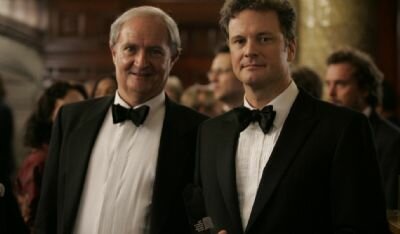|
|
| Tookey's Review |
|
| Pro Reviews |
|
| Mixed Reviews |
|
| Anti Reviews |
|
| Cast |
|
| |
 |
| |
| Released: |
2007 |
| |
|
| Genre: |
RITES-OF-PASSAGE
DRAMA
|
| |
|
| Origin: |
UK |
| |
|
| Colour: |
C |
| |
|
| Length: |
93 |
|
| |
|
| |
|
|
| |
|
|
Touching, well-acted drama.
|
Reviewed by Chris Tookey
|
|
|
There’s no doubt about the performance of the week. That’s by the great Jim Broadbent (pictured left), who has never been more touching than as poet Blake Morrison’s dad. This bitter-sweet memoir is a well-crafted, beautifully acted, little film that explores the father-son relationship with remarkable candour and probes at aspects of Englishness that rarely make it on to the big screen.
|
|
Broadbent plays a larger-than-life, cheerfully insensitive, middle-class doctor who’s far too afraid of showing emotion to tell his son that he loves him. Even when the adult Blake (played, somewhat flatteringly, by Colin Firth (pictured right) – Alan Cumming would have been a better physical likeness) wins a poetry prize in middle age, his dad can’t bring himself to say “Well done”. Instead, he complains jovially that Blake should have done something useful like medicine, and announces that the award is made out of plastic.
|
|
David Nicholls’ skilful, sympathetic and sensitive screenplay uses flashbacks to Blake’s youth, where he is played first by Bradley Johnson, then (very well) by Matthew Beard. As in the book, the layers of the father’s character are gradually peeled away: from the blustering, pompous and egocentric fellow he is on the outside, to the scared and surprisingly loving man he is at heart. I defy anyone not to be moved by the end.
|
|
The big weakness of the film as drama is that not a lot happens. It also lacks suspense and unpredictability. The only “secret” – that the father may have been conducting a long-term affair – is signalled so far in advance that it comes as no surprise. Whereas a novel can bring out what the author is thinking, in the movie Blake is passive and reactive. Firth brings intelligence and an element of self-mockery to the role; but despite his best efforts, Blake comes across in adolescence as a prig, and in adulthood as just as much of an egotist as his father, and far more of a whinger.
|
|
The film won’t travel well. Its respect for the way the English middle classes restrain expression of their emotions would be described across the Atlantic as “denial”. But that’s partly why I liked it.
|
|
Director Anand Tucker (Hilary and Jackie) wins fine performances from all his cast. I especially liked Juliet Stevenson as Blake’s long-suffering mum, Gina McKee as Blake’s almost as long-suffering wife, and Sarah Lancashire as “Auntie Beaty” who may or may not be having an affair with Blake’s father.
|
|
The film really belongs on the telly, if not the radio, where it would be sure to pick up the acting awards it deserves. In the cinema, it has about as much chance of being a hit as I have of becoming a Dame of the British Empire. But that doesn’t mean I’m sorry to have seen it.
|
|
|
|
|
|
|
